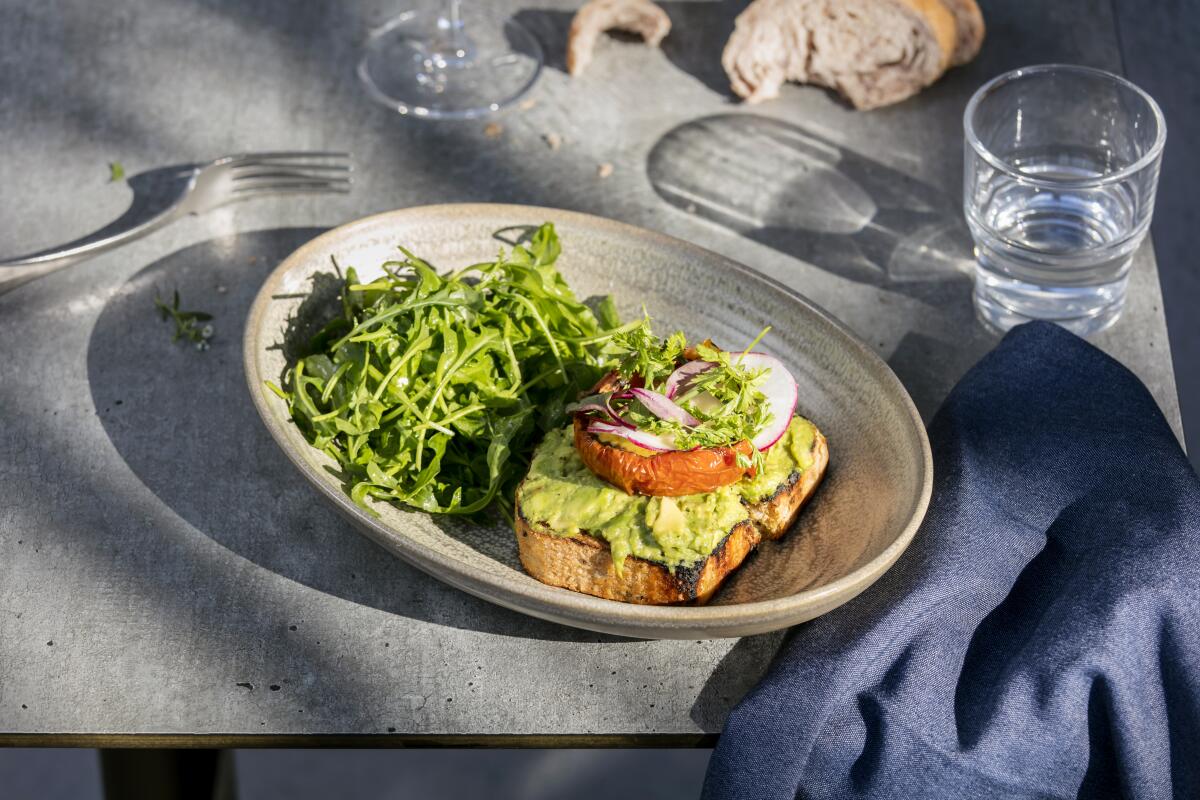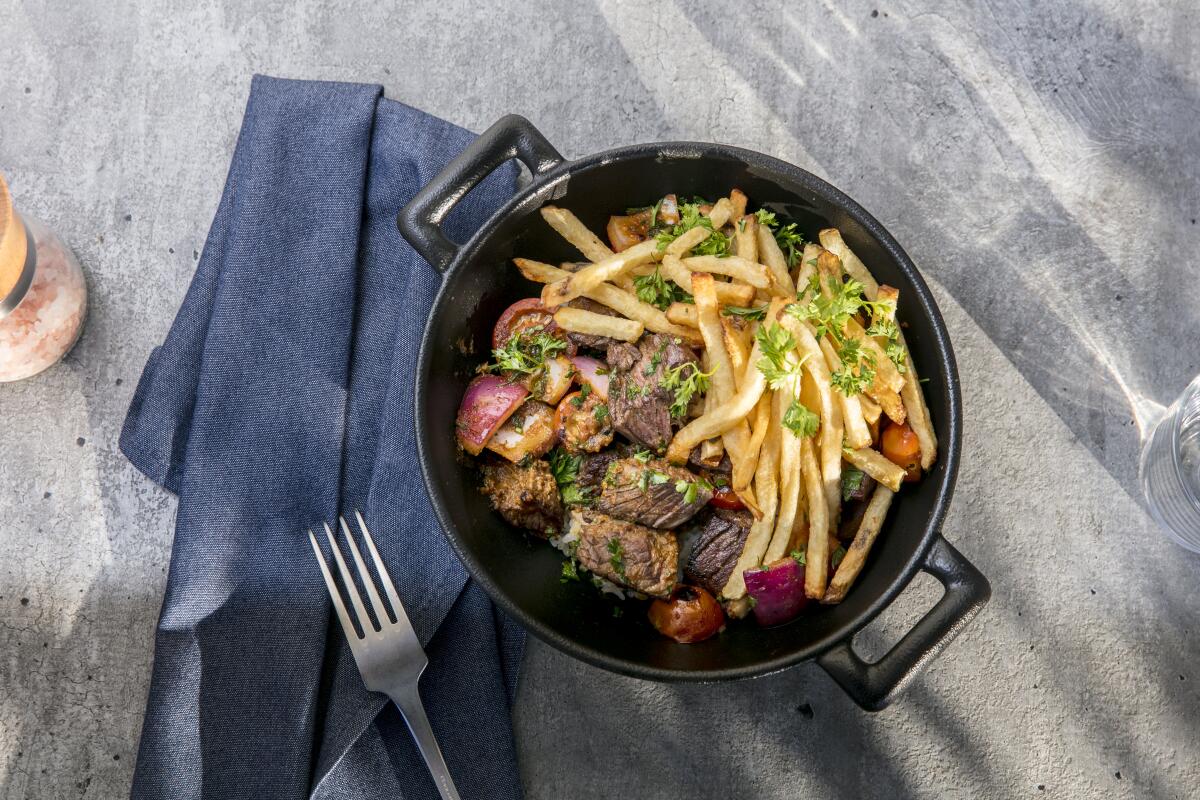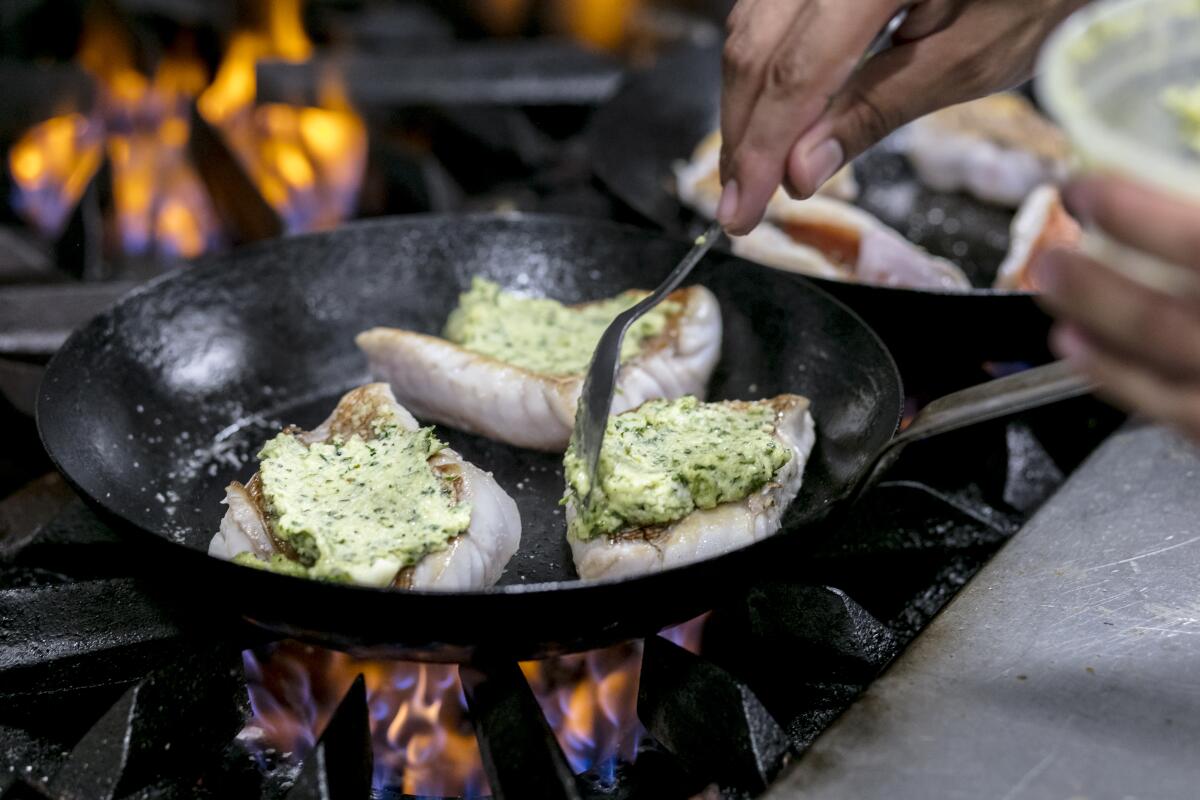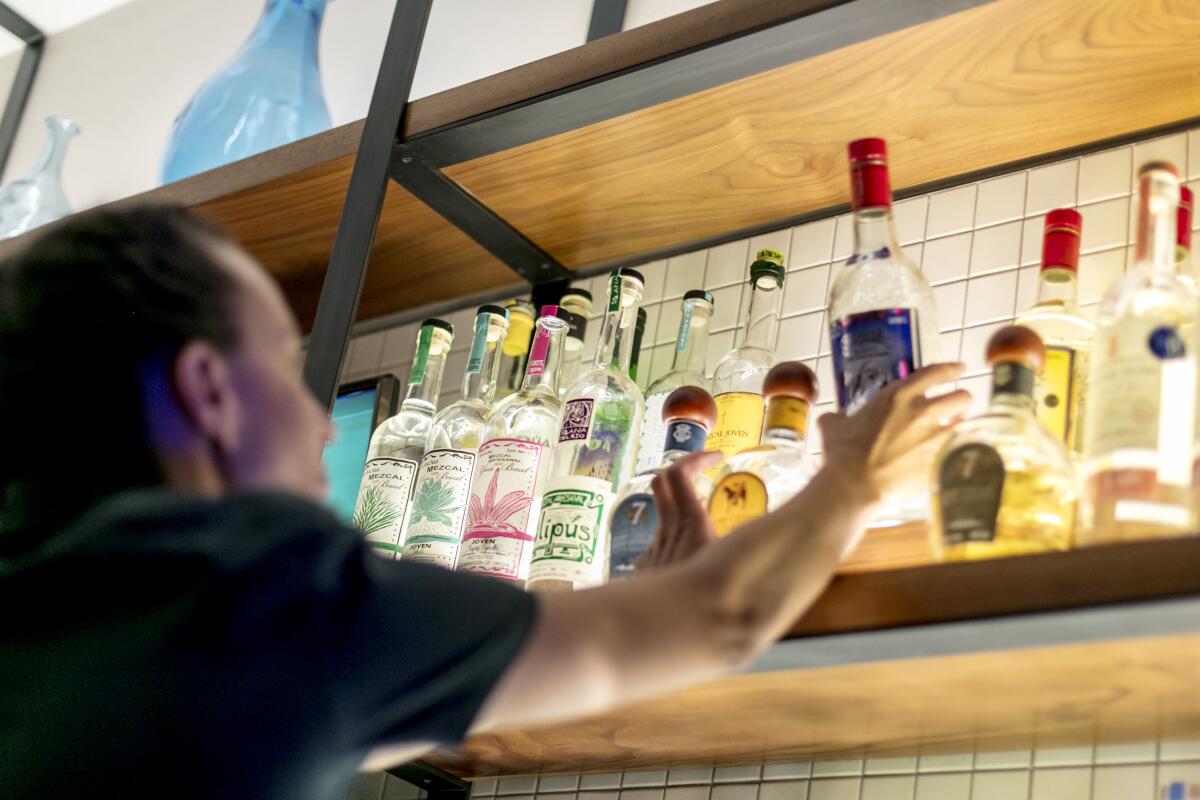At Pikoh, Peruvian superstar chef Ricardo Zarate holds back his fastball for a West L.A. crowd

- Share via
What happens when a chef becomes the expert on a cuisine, then mutes that mastery to try something completely different?
It’s a question to ponder when eating at Pikoh, an all-day bistro in West Los Angeles that superficially seems like any of-the-moment restaurant in the area. The interior — lit by skylights, made homey with houseplants and wood accents — is airy and radiant. The menu, which includes activated charcoal bowls, Thai iced tea, shakshuka, freshly brewed bone broth and chicken and waffles for weekend brunch, reads like a potluck thread from the @LosFelizDaycare Twitter account.
The salvation to this parody-ready setup is supposed to be Ricardo Zarate, the preeminent Peruvian chef in Los Angeles, if not the United States. He’s recently been scaling summits that recall his first run for fame earlier this decade, when his trio of restaurants, Mo-Chica, Picca and Paiche, got Southern California eaters to think about Peruvian cuisine beyond pollo rostizado and the high-priced creations of Nobu Matsuhisa and his pretenders.

He won a best new chef award from Food & Wine in 2011, opened a spot in Santa Barbara, and there was talk of London projects and a mainstream breakthrough. But Zarate abruptly left that all in 2014; his restaurants quickly withered away. A series of pop-ups was his only public presence for a bit — while delicious, they seemed like the culinary equivalent of Joe Louis greeting guests at Caesar’s Palace.
Zarate roared back in 2017 with Rosaliné in West Hollywood, then followed up last year by signing on to the second location of Los Balcones, in Studio City; both got rightful, glowing reviews in this paper. That’s what makes Pikoh (where the compa James Jung is his chef de cuisine) so frustrating.

The food is never bad, and it’s sometimes really good. The avocado toast made from quinoa bread looks like a cliché but is saved by the pan, baked at Pikoh, which has a fabulous nuttiness; it also buttresses an otherwise unremarkable bacon-and-eggs and a creamy salmon tartine.
Pikoh’s albacore tiradito sears gracias to the judicious use of ají limo. (Allow the gardener in me to vent, please: American seed suppliers have branded the fantastically fruity ají limo as the “lemon drop pepper,” a travesty in naming that evokes the Brach’s confections that are the Cincinnati Bengals of sour candies. By all means, grow them, but please don’t call them that.)
Jung’s cooking shines in dishes such as a chicharrón-esque pork tonkatsu served with sinus-searing Japanese mustard and a fish of the day simmered with bok choy, dashi and shimeji mushrooms.
And when he and Zarate focus on Peruvian dishes, like a silky arroz con pollo, an umami-heavy lomo saltado or anticuchos drizzled with a sharp yuzu aioli, it’s the two at their best.
But Zarate kneecaps Pikoh throughout his dishes: They whisper Peru when they should scream it.

He uses huacatay in a pesto for a hen of the woods platter, as a sauce in the kimchi fried rice, and infused in oil for a take on caprese. But none of them has the musky pungency that makes the herb such a hallmark of Peruvian cooking. It makes a wispy appearance in salmon miso that is bogged down by gochujang that somehow lacks its customary taste or heat.
The chorizo and lamb ragu pleases, but the huancaina promised on the menu is less than an afterthought. I’m always excited to see rocoto, a pepper nearly impossible to grow in Southern California, but the kitchen reduces its fleshy heat to mere hints in the honey, butter and aioli where it appears.
Beyond the food, Pikoh trips on key points. There’s a nice bar that serves strong cocktails, with sections devoted to rums, bourbons or Bruts, along with a foamy pisco sour. But it doesn’t open until happy hour, which also means that you can’t order the nonalcoholic, clove-heavy chicha morada until then. I appreciate that the bartenders make it fresh, but chicha in the motherland is allowed to sit and ferment — and if Zarate thinks making the beverage to order beats that custom, he’s wrong.

The staff is friendly but forgetful and not terribly literate with the cuisine in which Zarate made his name. On two separate visits, I asked for ají, the Peruvian version of salsa. Once, a waitress offered Cholula; the other time, a waiter didn’t know what ají was, which is like a server at a Vietnamese restaurant not knowing their nuoc cham.
At the moment, it feels like Zarate is holding back his fastball for a West L.A. crowd. But we know the heaters he can bring. Rosaliné remains fabulous; I still yearn for the scintillating ceviches Zarate served from his original stall at Mercado La Paloma. A stop here isn’t a mistake. When he cooks with no expectations and with Peru in his hands instead of on his mind, Zarate is one of the best in Southern California dining. Let’s see more of that at Pikoh.
**
Pikoh
All-day West L.A. Peruvian-inflected bistro with a bar that doesn’t open until happy hour.
LOCATION
11940 W. Pico Blvd., Los Angeles; (310) 928-9344; pikohla.com
PRICES
Breakfast $10-$13; lunch $10-$20; dinner $5-$28
DETAILS
Credit cards accepted. Full liquor after 5:30 p.m. Valet parking, or street. Dining room and restroom are wheelchair-accessible.
RECOMMENDED DISHES
Tiradito; any purely Peruvian dishes; quinoa toast
More to Read
Eat your way across L.A.
Get our weekly Tasting Notes newsletter for reviews, news and more.
You may occasionally receive promotional content from the Los Angeles Times.











